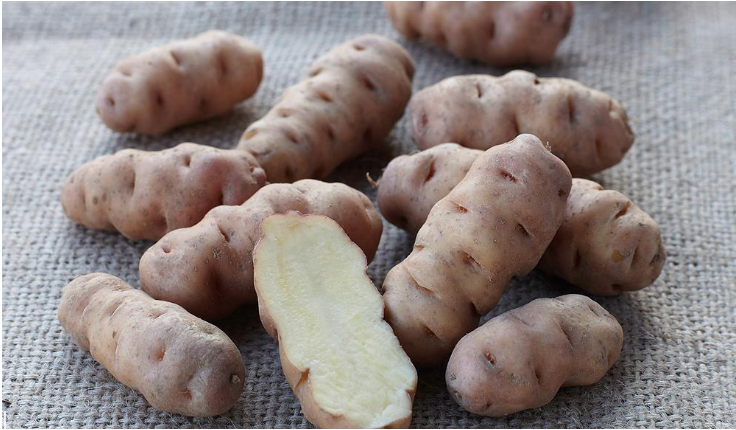Crop: Solanum tuberosum L. (Potato)
Swiss potato, known as early as 1850 between Prättigau and Safiental in the canton of Graubünden. The name ‘Parli’ derives from an old Walser dynasty. The discovery of duplicates from various villages in Graubünden testifies to the former spread of the variety. Elongated tubers with very deep eyes. Skin salmon pink, rough; flesh light yellow. Low yields, low susceptibility to late blight and rotten tubers. Robust variety. Flavourful taste of nuts and sweet chestnut. Mealy but very compact tubers.
Cultivation System: Several accessions of this variety have been found at different locations in the Canton Graubünden in Eastern Switzerland.
Geographical Information
Country: Switzerland
Several accessions of this variety have been found at different locations in the Canton Graubünden in Eastern Switzerland.
Farmer(s) description:
As potatoes used to be an everyday food in the 18th and 19th century and until the middle of the 20th century, this landrace had probably been in use by pretty much everybody who grew some potatoes, family gardeners and farmers alike. However, with the promotion of a few selected potatoes by
agricultural institutes since 1925, the use of Parli and other old varieties was drastically reduced until the landrace only survived in some few family gardens at the end of the 20th century.
Propagation system: Clonal
Multiplication procedures and consequences on landrace diversity:‘Parli’ can only be multiplied by vegetative propagation as the plants often drop the flowers at the beginning of flowering, and fruits are never built.
The landrace is very robust to late blight and has a good multiplication rate, which lets it maintain easily. However, viruses can reduce the already low yields drastically over the years, resulting in small tubers at harvest. Therefore, the landrace was held only by real fans, and nowadays a conservation method that excludes viruses and other diseases is crucial.
Management plan existence:As the susceptibility to viruses and other diseases is true for other potato varieties as well, the ProSpecieRara foundation in collaboration with other institutes initiated a professional conservation project for Swiss heritage potatoes in different collections. The main goal of these collections is to keep the varieties and to provide healthy basic seeds for further propagation without any virus infections. In the primary collection, potatoes are kept in vitro. In the first secondary collection, potatoes are grown under heavily protected conditions. In the second secondary collection, potatoes are grown in the mountains where there are no aphids, the latter being the main vector for passing on viruses. From these secondary collections, potato seeds are propagated in further steps in order to provide enough seeds for the needs of farmers and gardeners. However, there is no additional intention to secure the landrace in on-farm conservation. Only a few farmers propagate their own seeds for one or two years, before they buy fresh and healthy seeds again.
Added Values
Although Parli is considered and appreciated as a delicacy due to its chestnut-like flavour, the market is small as prices are high. Due to its rather low yields, small tuber size and difficulty in obtaining potato seeds only few farmers in Switzerland cultivate ‘Parli’ thus creating a limited supply to the market.
Others (e.g. commercial/geographical brands or special traits):Efforts initiated by ProSpecieRara are underway to promote Parli among other potatoes as a speciality for marketing through selected grocery stores and in the top gastronomy. Due to its very rich flavour profile, these potatoes are used as an exclusivity and not only as a staple food.
The Swiss MOA (Ministry of Agriculture) supports professional conservation efforts and projects for the promotion of Parli. With this support and the support of many donators the ProSpecieRara foundation is able to take responsibility for the distribution of available potato seeds.
The financial support exclusively aims at conservation by professional institutes under protected conditions, as well as multiplication efforts to yearly reach a certain amount of seed potatoes. Keeping potatoes healthy on farm is difficult in the long run, implicating a demand for fresh and healthy seeds everyone to three years.
The ProSpecieRara foundation is exclusively distributing seeds of Parli, as well as seeds of other heirloom varieties. Potatoes for food consumption are available in specialties stores and in gastronomy.
Case study provided by ProSpecieRara, Switzerland.
ND.
